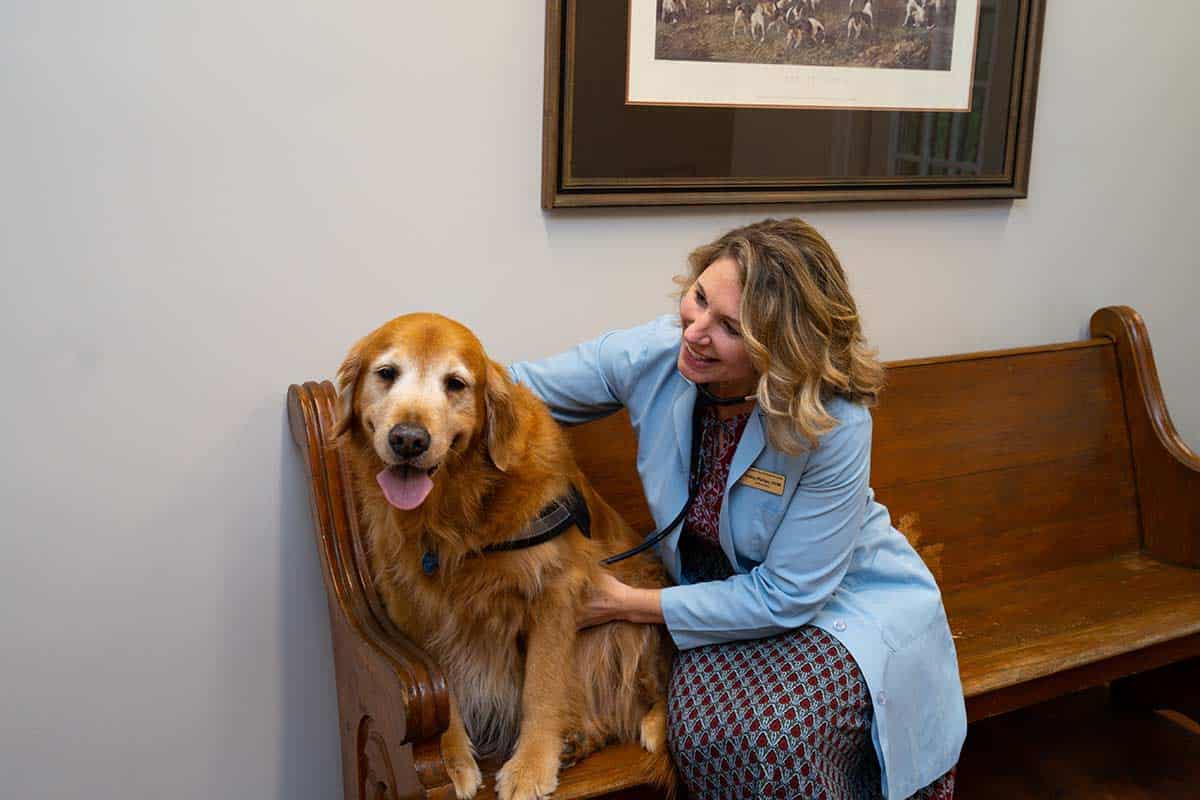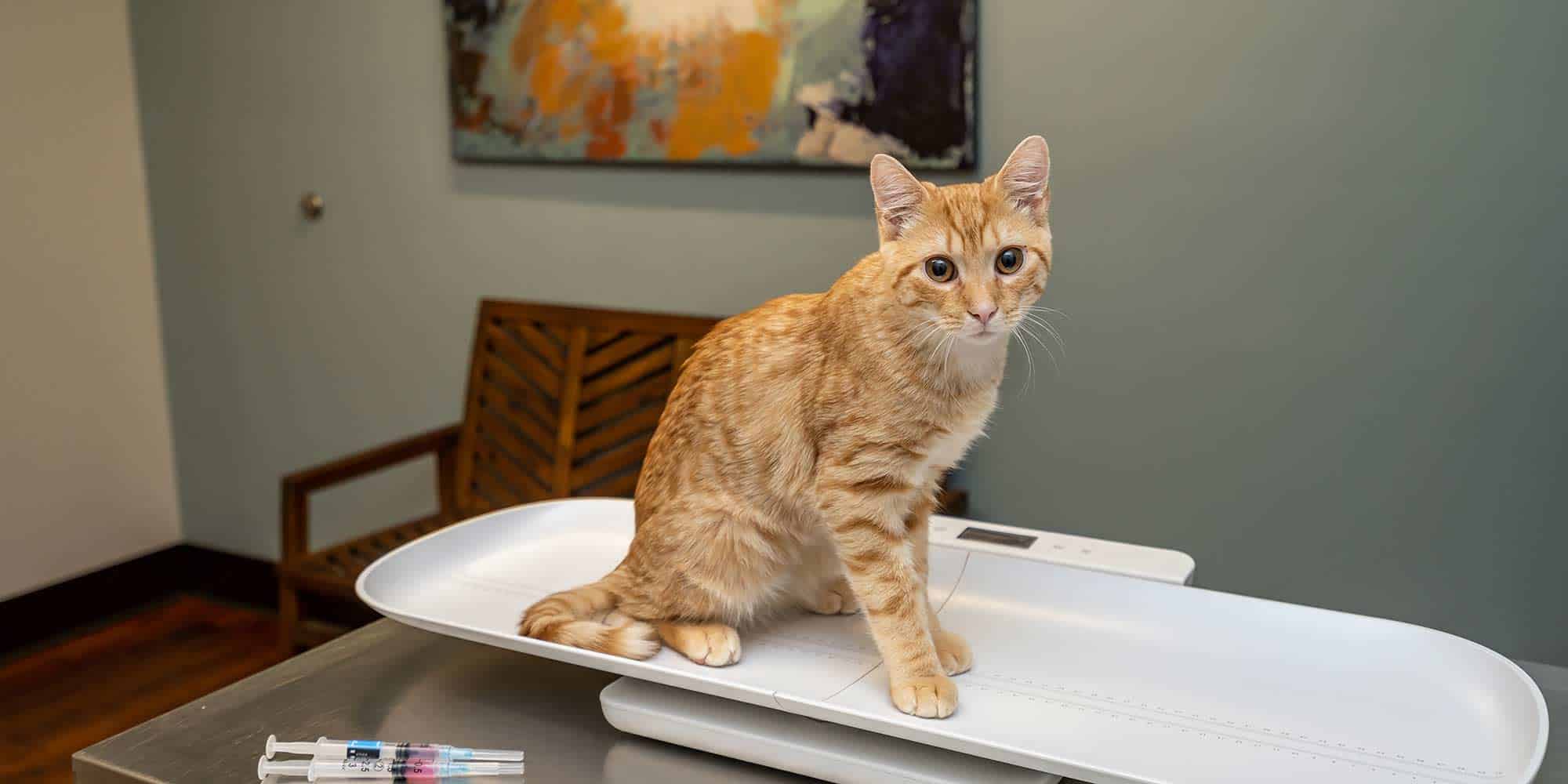Wellness and Preventive Care: Your First Line of Defense Is a Little Offense
Regular preventive care is the best thing we can do for the well-being of our pets. Wellness visits, parasite prevention, eye care, and vaccinations are all important parts of proper preventive care.

Wellness Visits for All Life Stages
Routine wellness checks are important for the health and overall well-being of your pet. A once a year wellness check is important even for pets that are otherwise healthy. Your pet’s wellness and preventive needs will change depending on what stage of life they are in.
- Puppies and kittens need to be seen by the veterinarian several times in the first few months in order to keep all vaccinations up-to-date and monitor their growth during this time of extreme change.
- Adult dogs and cats can usually be seen once per year to receive vaccines, a general exam, blood work, and parasite control.
- Senior pets need to be seen more often in order to catch any issues associated with aging.
During a routine wellness exam, your veterinarian will thoroughly check your pet from head to tail. He or she will administer any needed vaccines, perform a fecal exam to check for internal parasites, check the pet’s heartworm status, and take note of any external parasites.
Puppy and Kitten Care
Congratulations on your new pet, and thank you for choosing us to be your partner in caring for your new family member! Adding a new puppy or kitten to the family is an exciting time. You want to make sure that you do everything correctly, and we are here to help you every step of the way.
Puppy and Kitten Nutrition
Choosing the correct food is perhaps one of the most important first steps in your new pet's life. We will be glad to discuss options with you that take into consideration your new pets nutritional needs based on breed, size, and growth rates.
Vaccinations
Following your veterinarian’s vaccination schedule is also important for your new puppy or kitten. These vaccinations help prepare your new pet's immune system to protect them from many serious but preventable infectious diseases.
Puppy and Kitten Exams
In the first several months of your new pet's life, you will need to visit your veterinarian often for vaccinations and exams. This will ensure that your young pet is growing correctly, is healthy, and parasite-free.
During these exams your veterinarian will make sure that your puppy or kitten is able to see and hear, has no serious dental problems, and has no internal or external parasites. Intestinal worms are common in both puppies and kittens. Your veterinarian will administer an oral medication to remove internal parasites if they are found during an exam.
Training and Behavior
Training and behavior are other important aspects of these early months with your new pet. Please feel free to ask our friendly and knowledgeable staff about any problems you may be having, or for recommendations about proper training. Now is the time to teach your puppy or kitten skills and lessons that will help them be good and loving members of your family.
Senior Pet Care
Senior pets are special members of the family. Even though they may be slowing down a bit, they still like to snuggle and even occasionally play like they did when they were younger. Our senior pets need special care in order to remain healthy as they age. With proper care, diet, suitable exercise, and medical supervision our senior pets can live long and happy lives.
Special Nutrition and Health
Obesity and diabetes are both serious concerns for the senior pet. As their activity level declines, it is important to make sure their food does not contain more calories than their bodies can use.
We carry diets that are age and breed appropriate to keep your older pet fit and trim instead of fat and unhealthy. Overweight senior animals are also more likely to suffer from arthritis and join pain as opposed to their healthy weight counterparts.
Senior Visits and Screenings
Along with routine vaccines visits, senior pets should be seen more regularly by their veterinarian. During a senior wellness exam, the same basic checks and routine lab tests will be performed to form a baseline and identify any changes in your pet’s health. These more frequent visits will make it more likely that serious health problems can be identified before they become major health concerns.
Your veterinarian will also recommend a more extensive blood work panel in order to keep close tabs on the functioning of your pet's major organs. Your veterinarian will discuss any changes that need to be made in the care of your senior pet, such as an age appropriate diet or pain control for arthritic changes.
Behavioral Changes
Sometimes older pets may have behavioral problems that were not a problem when he or she was younger. These can be caused by pain, poor eyesight, poor hearing, or other health problems. Make sure to tell your veterinarian about any change in your senior pet's personality as this may be a clue about a potential health issue.
Breed-Specific Care
Different breeds of dogs age differently. Small dogs do not enter their senior years as early as larger breeds. Most breeds of dogs should start receiving senior care around 7 years old, and most cats around 8 years old.

Health Answers
We understand a trip to the vet can be stressful for your pet. We offer outdoor exam rooms for those that do not enjoy entering the hospital. This is a great time to bring up any health questions or behavioral concerns you may be having about your pet. Our expert staff will also be happy to help you with any behavior or training issues that may occur. This includes difficult house training, excessive barking, or even aggressive behaviors.
Your wellness visit gives the veterinarian the opportunity to detect any potential health issues before they become serious or life threatening. Problems like heart disease, kidney or liver disease, diabetes, cancer, and arthritis benefit greatly from early detection. This can improve the prognosis, reduce costs, and improve your pet’s quality and length of life.
Parasite Prevention
Internal and external parasites can have a serious impact on your pet’s health. There are parasites you can see like fleas and ticks, and parasites you can’t see such as roundworms or heartworms. Many of these parasites can also affect you and your family members as well as your pets.
During your wellness exam, your veterinarian will discuss ways to get rid of external parasites and will test to see if your pet has any internal parasites. If there are any internal parasites present, your veterinarian will give your pet medication to remove them. He or she will also discuss effective prevention of heartworms and fleas and ticks in order to protect your pet.
Vaccinations
Regular vaccinations are necessary to protect our pets from many deadly infectious diseases. No one enjoys shots. A moment of discomfort can protect our beloved pets from so many diseases that are difficult and expensive to treat and can be very painful.
Talk with your veterinarian about which vaccines are required by law and which ones are recommended to protect your pet.
Eye Care
Keeping your pets eyes healthy is important. So far we have not been able to come up with glasses or contacts for dogs and cats, so we must be careful to protect their vision.
Eye injuries constitute an emergency, and your pet should be seen by a veterinarian as soon as possible. It is important to notice any changes in your pet's eyes such as excessive tearing, squinting, discharge, swelling, or a cloudy appearance and report these changes to your veterinarian.
Dogs and cats can experience many of the same eye diseases as humans and our veterinarians are skilled at diagnosing these and many other disorders of the eye. Glaucoma can affect our pets and cause pain and vision loss if left untreated.
Many problems can be treated with medicines or medicated eye drops. For more complex eye diseases such as cataracts that require surgery, we refer our patients to a veterinary eye specialist in Greenville, SC.
Whatever stage of life your pet is in, call us today or submit a request online to schedule a wellness exam to keep him or her healthy for years to come.



